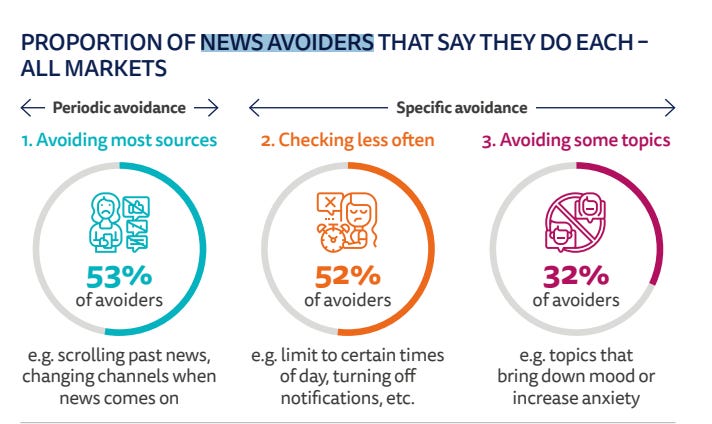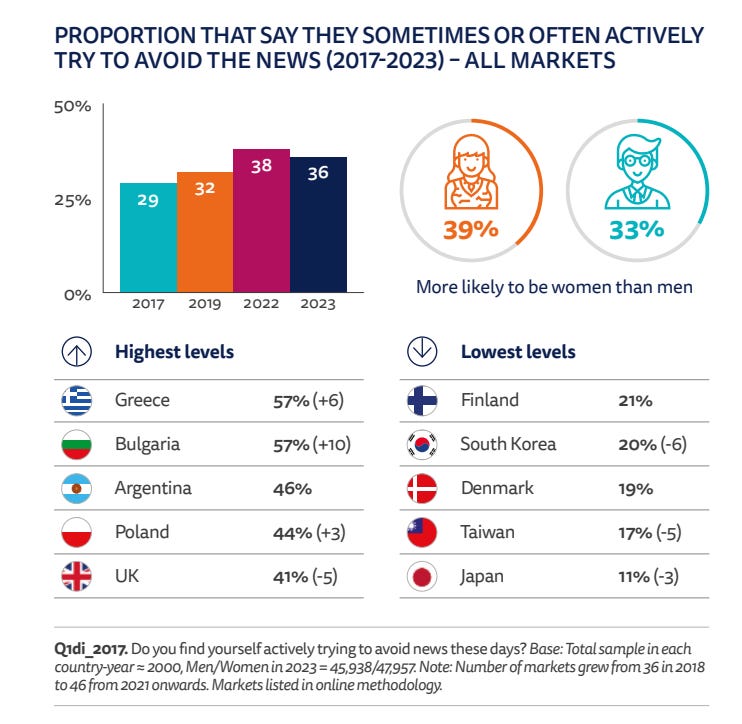Kapow! It's Nick and Amol vs. The News Avoiders
Need a super-humanly bullshit excuse for the Today programme's audience slide? Fear not! Robinson and Rajan have the answers... apparently.
Previously: The values of the Arsehole Warehouse
GB News has apologised for Laurence Fox’s misogynist rant and suspended him. Dan Wootton says it’s not what the channel is about. 🤡
Early in the Radio Times’ interview with Nick Robinson and Amol Rajan — commissioned to promote their new podcast (the utilitarianly titled The Today Podcast) — the latter is described as “the Maradona of broadcasting”.
The writer, Michael Hodges, seems to intend the comparison as a compliment1 but it does, sort of, work: Maradona was willing to do whatever it took to win, ubiquitous as his peak, and as likely to irritate as he was to inspire. While I’ve been told by several people who’ve worked with Rajan that he was a decent boss and a good colleague, I find his broadcasting style about as comfortable and welcome as Return Of The Durutti Column promotional sandpaper y-fronts.2
Similarly, I’ve little time for Rajan & Robinson — the name of an over-priced off-licence that will persuade you to shell out for spendy mixers that taste no better than supermarket squash — attempting to start the world’s most low-energy, low-stakes beef war with podcast old-hands and former colleagues:
How annoying is it that the discussion points that are generated [on the Today programme] become rich debate elsewhere? These are times of plenty of news podcasts like The Rest is Politics, presented by Alastair Campbell and Rory Stewart, or The Newsagents, presented by former BBC journalists Lewis Goodall, Jon Sopel and Emily Maitlis — or any other of the podcasts that are, says Robinson, “Basically, we listened to the Today programme this morning and this is what we think about it.”
“Being ex-BBC people, they know the score, that you’ve got to do something different,” says Rajan. “But we can’t spout particular opinions on things. The Rest Is Politics can say what they think about Brexit. A lot of people I know listen to that and really like having their own world view reinforced to them.” It sounds like that rankles.
“We haven’t held political office and aren’t just looking back,” says Robinson, in what might well be a dig at Stewart. “We don’t have a political position to promote or push. We're not just, ‘Oh, that’s rubbish.’ We’re not centrist dads, we’re journalist dads.” A prevalent strain of BBC News arrogance comes steaming off those paragraphs; that Robinson — a former chair of the young Conservatives — and Rajan — an admirer of Roger Scruton, who contributed to the right-wing philosopher’s often deeply unpleasant Salisbury Review ("the magazine of conservative thought") — purport to be spotlessly free of political positions highlights again the ludicrous fantasy of BBC ‘impartiality’ and the arrogance of those who believe they scrupulously uphold it.
I’ve no desire to defend The Rest is Politics — Stewart, a definitely not-a-spook ex-minister with a uniform fetish play fighting with Campbell, the former spin-doctoring war crimes enabler — but Rajan’s (correct) claim that the podcast reinforces the worldview of its listeners applies equally to the Today programme. You could listen to Today for a thousand editions on the bounce and never encounter substantive or sustained criticism of landlordism, monarchism, colonialism, or any number of other aspects of the British establishment worldview.
Rajan and Robinson no doubt believe that they ‘speak truth to power’, but at best they ineptly attempt to give ‘power’ a dead leg. And that’s a better explanation for the dip in listenership at Today than the one that seems to comfort Robinson. He says:
People just want to avoid the news. Market research literally calls them ‘news avoiders’. We will all know people who think, ‘I just can’t face the world any more.’” Rajan, of course, backs him up:
Read the latest Reuters report. The graph is like the side of a mountain. Interest in news has fallen from something like just over 70 per cent to something like 45 per cent. That is a precipitous drop. Robinson continues:
Convincing those people that it’s worth joining us for a few minutes each day is the challenge. Not, do they listen to this podcast or that?
… Tone is important. Being friendly, not being overly aggressive for the sake of it. It’s optimism, hope, as well as scepticism and scrutiny. It’s recognising that people are listening in this incredible, more intimate way. So that you don’t want to just be like, ‘Oh, shut up. Stop shouting at each other. I did read the Reuters Institute for the Study of Journalism’s Digital News Report 2023 and not because Amol Rajan said I should.
Here’s what it says about ‘news avoiders’:
News avoiders are more likely to say they are interested in positive or solutions-based journalism and less interested in the big stories of the day. Amongst avoiders, almost four in ten (39%) said they had avoided news on the war in Ukraine, followed by national politics (38%), issues around social justice (31%), news about crime (30%), and celebrity news (28%).
Selective avoidance of Ukraine news was highest in many of the countries closest to the conflict, reinforcing findings from our additional survey last year, soon after the war had begun.These declines in news interest are reflected in lower consumption of both traditional and online media sources in most cases. The proportion that say they did not consume any news in the last week from traditional or online sources (TV, radio, print, online, or social media) has increased again this year across countries. The highest proportion of ‘disconnected’ users can be found in Japan (17%), the United States (12%), Germany and the UK (9% each). But in countries like Finland (2%) a much smaller proportion are disengaged.Robinson and Rajan are engaged in a familiar pattern of arrogance, disconnection, and self-protection: There are simply ‘news avoiders’ and the reasons why they are inclined to engage in that avoidance are nothing to do with how presenters, editors, correspondents, and producers do their jobs. It’s definitely nothing to do with such a narrow range of voices being represented on those broadcasts or that Rajan appears in so much BBC output that, with role expansion, by 2025, a show in which he interviews an AI version of himself is grimly inevitable.
Robinson is right that tone is vital but he seems convinced that Today is mostly getting it right; Principal Skinner-like, he believes that he and his colleagues cannot be out of touch so it must be ‘the children’ — listeners, who are increasingly patronised — who are wrong. Later in the interview, he makes a good point…
I think it’s lazy for the BBC [to say], and I’ve never said, “Because both sides are attacking us, we’re getting it right.” There have been certain issues in the past where the BBC has looked at its coverage — the Middle East is a classic example — where both sympathisers with Israel and sympathisers with Palestine thought we were getting it wrong. And they were both right. Our coverage wasn’t good enough. … but Rajan undermines it by suggesting their new project is part of the solution:
… that’s what the podcast can do, says Rajan — reassert the values of unbiased BBC journalism: “News that’s fair,” he says, “Fair, accurate, impartial. Reithian.” A reminder from history: When the BBC was not yet 4 years old, it quickly acquiesced to government pressure during the General Strike of 1926. The British Broadcasting Company — in the midst of negotiations to become a public corporation, gain its first Royal Charter, and shake free of the direct control of the Postmaster-General — kept, according to an internal report, “[in] close touch with the appropriate departments [and ensured] the bulletins fell in line with government policy”.
Reithian has been spun as a polished philosophy of independence in the years since but flesh and blood Reith was a man of the establishment to his very bones. He wrote, in an essay published in August 1963, after his retirement from the BBC and elevation to the Lords:
… if there had been broadcasting at the time of the French Revolution, there would have been no French Revolution; the Revolution came from Marseilles to Paris as rumour. The function of the BBC was fully as much to kill falsehood as to announce truth, and the former can derive automatically from the latter.In the same article, Reith said the company had been “neither commandeered nor free”. Then BBC Director-General, Charles Curran, was equally blunt in a speech to the Edinburgh Broadcasting Conference in 1971:
[The BBC] is a creation of the Establishment, and it depends on the assent of the Establishment for its continuance in being.No current BBC executive or presenter could / would be as honest as Reith or Curran. In the Radio Times article, Rajan grumbles about “the absolute filth and nonsense that is written about [the BBC]”. That sort of siege mentality is not uncommon at the BBC and, given the weight and frequency of attacks from right-wing papers and broadcast rivals, it’s not surprising. But it’s also a symptom of an equally common delusion: That BBC news coverage is ‘fair’ and that ‘balance’ isn’t applied in a ludicrous fashion.
I can’t fairly judge the Today Podcast until the first episode is released on October 5, but I can make some predictions. It will be chummy; it will be produced to sound more spontaneous than it actually is — in the same way as Robinson’s Political Thinking podcast — it will be stretch to make Rajan and Robinson sound keener on each other than they actually are; and it will, just like the rivals its hosts took pops at in the Radio Times interview, comfort its listeners in a range of (mostly) middle-class assumptions.
What it is highly unlikely to do though is lure any of those new avoiders that Robinson believes are behind the dip in Today’s listenership back into the world of Thought for the Day, slavish repetition of Sun and Daily Mail talking points, and fawning interviews with celebrities who are somewhat confused about what they’re doing there.
Thanks for reading. X/Twitter is one of the main ways people find this newsletter so please consider sharing it there…
… and also think about following me on Threads and TikTok.
Upgrade to a paid subscription to this newsletter, you’ll get bonus editions, and I’ll be able to keep writing these newsletters). It really helps and allows me to spend money on research and reporting.
… because he is “compact, bullish [and] apparently unstoppable…”
This was not a real marketing item but, in fact, a product of my increasingly deranged psyche.






This is going to suffer from the paradox that whether one sticks their head up their arse or sits their arse on their head, the result is the same.
The Toady roadshow of soapy denialism lends a falsehood to people who think they have an interest in understanding what is happening but not bothering to reach further for the why it is happening.
Three hours of Daily Mail overshadowed over/editorialised kowtowing interspersed with the odd frustrated interviewer tripping up an incompetent minister.
Near pointless.
Well said. Can't see how they decided there's a need for another bland centrist podcast.